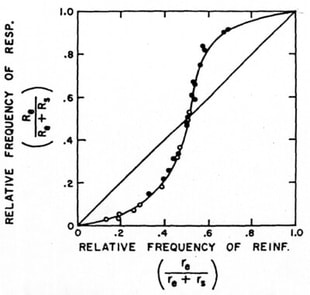 People don't want to carry around food all the time. I get it. But consider this: Would you rather wash dishes or watch your favorite movie while eating ice cream? Not much of a decision, is it? But what if I paid you $100 for every dish, glass, and utensil that you washed? How about $1,000? Washing the dishes suddenly doesn't seem so bad! Every day we are faced with a myriad of choices, and each one is influenced by the Matching Law. Your dog is no different, and the options he chooses are the result of a number of variables, such as the rate of reinforcement (how many times has he been reinforced for the behavior), the quality of the reinforcement (how much did he appreciate that reinforcement), or the reinforcement delay (how quickly did he get the reinforcement). Consider this everyday scenario. Your dog has a decision to make: Will he jump up for attention, or sit to be greeted? When given the choice between two behaviors a dog will likely choose the one for which he has been rewarded more for in the past. That's the Matching Law: the chances of choosing one behavior over another are the direct equivalent of how much those behaviors have been reinforced. On the flip side, every time your dog is reinforced for doing an unwanted behavior the strength of the behavior we do want is weakened. For example, if we want our dog to sit instead of jumping on us or guests when walking into our home, we should avoid giving him the attention he is seeking (e.g. looking at him, talking to him, touching him) when he jumps up. In other words, every time he is 'rewarded' for jumping it reduces the chance of sitting instead. Teach him an alternative behavior to the unwanted behavior and give that HUGE value. And a common complaint I hear all the time: "Why does our dog listen to my husband but not to me?" Blame the Matching Law. If Spot is reinforced for sitting 90% of the time when John cues it and 40% of the time when Jane cues it, Spot will tend to sit for John 90% of the time but only 40% of the time for Jane. Another important aspect of training your dog is managing your dog's environment so it is easy for him to make the best choice. Getting it right should require little effort on his part, and followed immediately by high value reinforcement. In summary, the more often your dog gets a behavior right and is handsomely reinforced for it, the more likely he will be to choose that response in the future. This is the Matching Law. Comments are closed.
|
AuthorJeff Dentler, CPDT-KA, IAABC-ADT, FFCP, CTDI Archives
July 2024
Categories |

 RSS Feed
RSS Feed